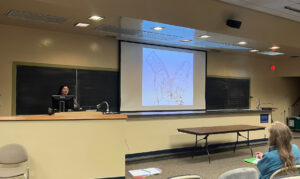By Ava Burchell, Staff Writer

Dr. Laura Harjo lecturing students (Photo Courtesy of Ava Burchell/The Gettysburgian)
On Thursday at 7 p.m., Associate Professor of Native American Studies at the University of Oklahoma Laura Harjo presented a lecture titled “Crafting Community Cartographies of Care.” It was the closing lecture to the Women, Gender, and Sexuality Studies (WGS) department’s series about feminist and queer approaches to land and nature.
Dr. Harjo is a Mvskoke scholar from the Wolf Clan of the Tuskegee tribal land. Her scholarship is dedicated to the intersection of geography and community care. She authored a book titled “Spiral to the Stars,” and she addressed some of its main topics during her lecture.
She was introduced by WGS Chairperson and Professor Nathalie Lebon and WGS major Juliette Rhinow ’25.
Dr. Harjo began her lecture by discussing the idea of futurity and how it relates to the past, present and future.
“In terms of the past, it’s activating the possibilities of our ancestors. For the present, it’s looking for the future that we wish for right now. In terms of the future, it’s putting the condition in place for our relatives that will be in a future temporality,” said Harjo.
She also addressed forms of power and the production of various items created through beading, printmaking, and hair braiding when the Indigenous community comes together. One form of power that Harjo discussed is community power: treating other community members as relatives.
“Maybe there’s an elder that lives next door by herself and maybe she watches the single mom’s kids during the day and then in the evening, they all eat dinner together,” said Harjo.
Harjo discussed how urban planners and geographers categorize land differently than the Mvskoke people. She also addressed the symbiotic relationship between Indigenous people and the land.
“Dancing on the land, to me, is a way of establishing a relationship with it. It’s a covenant and an agreement. You allowed me in this space to be with you, to reciprocate by relational accountability with that space,” said Harjo.
Harjo concluded by saying “mvto” (thank you) to her audience and opening the floor to questions. Many engaged students asked her about Native Americans’ relationship to the land and her previous activism.
Through her work at the Green Corn Collective, Dr. Harjo worked to bring attention to the injustices that Indigenous women and girls face, such as disproportionate incarceration in the United States and Canada. The Green Corn Collective placed a beaded prison bed at the Walt Disney Concert Hall in Los Angeles, California to raise public awareness about this issue as well as the growing number of missing and murdered Indigenous women and girls.
